Florence Nightingale is well remembered as the founder of a nursing order. She was also revered as a saintly vision by so many suffering and wounded soldiers during the bloody Crimean War of 1845.
From her ministering to the sick by the feeble light of a hurricane lamp, Miss Nightingale became immortalised as, “The lady with the lamp.”
Soyer, on the other hand, was a Frenchman, an author, a flamboyant egocentric, also a culinary genius. So how did these two unlikely souls come together? Perhaps it is not as strange as it first appears.
This is the second part of the story of Florence Nightingale, an English nurse, and Alexis Soyer, a French chef. The two part series has been joined together for your enjoyment. Bon Appetit.
Some time ago while standing in front of my fridge, door open, I was struck with the, “Old Mother Hubbard” syndrome. Visions sprang to mind of shuffling along, tin mug in hand, just one of many poor wretches in a soup kitchen line-up. Boldly demanding more. In thinking of soup kitchens…
The following is an account of two great contributors to mankind, Florence Nightingale, an English nurse, and Alexis Soyer, a French chef.
Few would argue that Florence Nightingale epitomised Victorian propriety. Anyone who attended school in years gone by has heard of this remarkable woman. The woman who came from a privileged British background and gave birth to the modern movement we know as Nursing.
Yet most have forgotten Alexis Soyer who was characterised more as an artistic and liberal thinker. A bit of a peacock as the saying goes.
Both literally gave their lives in the pursuit of simple solutions to what had been perceived as complex problems.

My research, however, indicates by the omissions in their own written accounts that they, the heroes of this story, were perhaps mere mortals after all. The reader will decide.
Alexis Soyer (1810-1858) was a culinary innovator, author, and humanitarian. Love and heartbreak played a large part in the course of his life. Soyer is known for several significant contributions to the culinary world.
During his short nearly fifty-year life-span he prospered within those illustrious English kitchens (if you can believe that) of the time. He commanded the gastronomic domains of notables such as Prince Polignac, the Duke of Sutherland and the Marquis of Waterford.
On the day of Queen Victoria’s Coronation, Soyer staged a triumphant breakfast for two thousand patrons of so-called “proper standing”. Other such culinary extravaganzas won him great accolades from those who could afford the expense. The publishing of his books on the subject of food and its history served to fortify his reputation almost to the point of legend.

Soyer’s capacity to invent and create led to the Patent Magic Stove, the first portable camp stove.
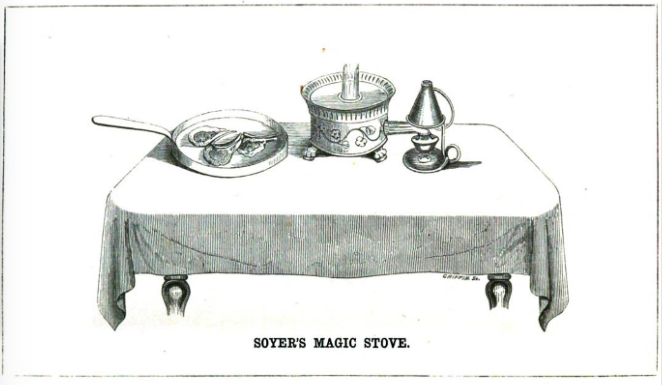
Other discoveries were; military hard rations, the Scutari Teapot and various sauces bottled by Messrs. Crosse and Blackwell.

Soyer became the centre of curiosity while visiting posh London restaurants. Surrounded by Lords and Ladies he would demonstrate the virtues of his Lilliputian magic stove upon a tabletop. That device became the standard kitchen kit on board Her Majesty’s Ships of war and Queen Victoria commissioned Soyer to design a galley which became the standard kitchen on board those same vessels.
He also created field kitchens.
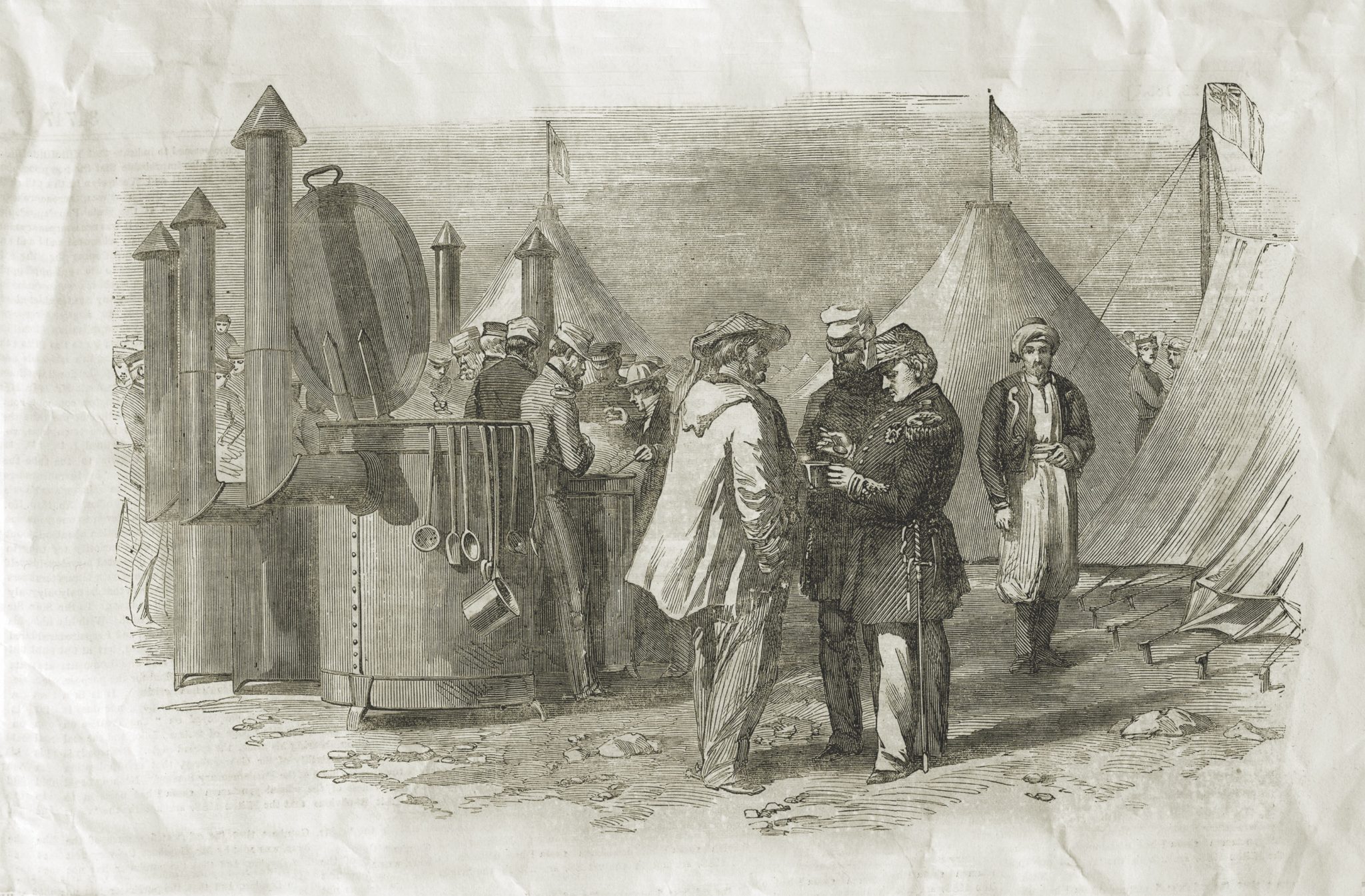
G39WYE The celebrated chef Alexis Soyer demonstrates his field kitchen for camp and bivouac in the Crimea, to Lord Rokeby and general Pelissier Date: 1855
Perhaps Soyer’s greatest claim to culinary excellence was his history-making tenure in 1837 as head chef in the sacrosanct kitchens of the London Reform Club. But, as history would later prove, Chef Soyer, apart from his palate-swooning society’s well-to-do, he was a generous humanitarian who dedicated himself to the needs of his suffering fellow man.
He wrote several cookbooks during his career, including "The Modern Housewife" and "The Pantropheon." His books were notable for their accessible, practical recipes and for promoting the use of simple, nutritious ingredients. He also introduced French culinary techniques to British cooking. But it is his 550 page book Soyer’s " Culinary Campaign " where we learn of his relationship with Florence Nightingale.

The Crimea placed Soyer and Nightingale in arguable circumstances of possible or probable intimacy. The book is interlaced with references to Nightingale. In it, the chef offers more than a page describing her face. In Nightingale’s book of greater volume, mentions of him are scant with hardly a paragraph devoted to him or their work together.
The Crimean War, which took place from 1853 to 1856, was primarily fought over a combination of religious, territorial, and political issues. On the 25th of October, 1854, 600 men rode into what is now known as the Valley of Death in the Charge of the Light Brigade.
The Battle of Balaclava was a conflict that pitted British, French, and Ottoman forces against the Russian Empire. The conflict was marked by several significant battles, including the Siege of Sevastopol, the Battle of Balaclava (famous for the Charge of the Light Brigade), and the Battle of Inkerman. The war ultimately ended with the Treaty of Paris in 1856, which brought about a resolution to the various issues in dispute. The treaty reaffirmed the integrity of the Ottoman Empire, recognised the rights of Christian subjects in the Ottoman Empire, and demilitarised the Black Sea to limit Russian naval power.
Florence Nightingale arrived in Scutari early in November 1854. Nightingale believed that the death rates were due to poor nutrition, lack of supplies, stale air, and overworking of the soldiers. It was here, in the Crimea, that Florence met Alexis Soyer.

But what had led renowned chef Alexis Soyer to the Crimea?
Love and heartbreak played a large part in the course of Soyer's life.
Soyer’s first serious adventure of the heart was Emma Jones, a young and very beautiful accomplished English painter.
Aboliitonist painting by Emma Soyer
She conquered his heart at a first meeting. Following an ardent courtship made difficult by Emma's strict father. they were married. Happiness and joy was theirs in a perfect match.
Unfortunately, this new-found bliss was ordained to be temporary. While attending business in Brussels fate dealt a cruel blow. His beloved Emma remained in London as she was heavy with child. A violent thunderstorm broke over the city, which frightened her terribly causing a premature confinement. Severe complications arose and sadly, both mother and child died. When told of the tragedy Soyer’s initial waves of numbing grief led to an attempt of self-destruction.
Although he later regained life’s useful purpose, Soyer was never to marry again. Immersing himself in work he re-organised the soup kitchens of Dublin during the great famine of 1845-49.
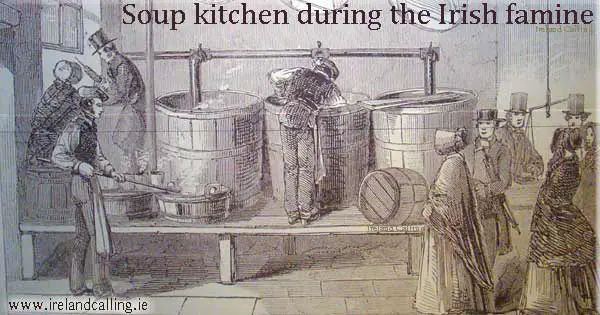
Soyer soon became aware of the scandalous misfortunes suffered by the British troops in the Crimea.
Lack of equipment and supplies notwithstanding, the poor wretched men were withering away unto death behind the front lines from bad food and ignorance. Soyer implored the British government to draw upon his skills. The government refused to finance his travels and so, at his own expense he set out arriving at Scutari in the Crimea in 1885. It was there, amid the mire of human degradation and man-wrought horror where Florence Nightingale and Alexis Soyer first met.
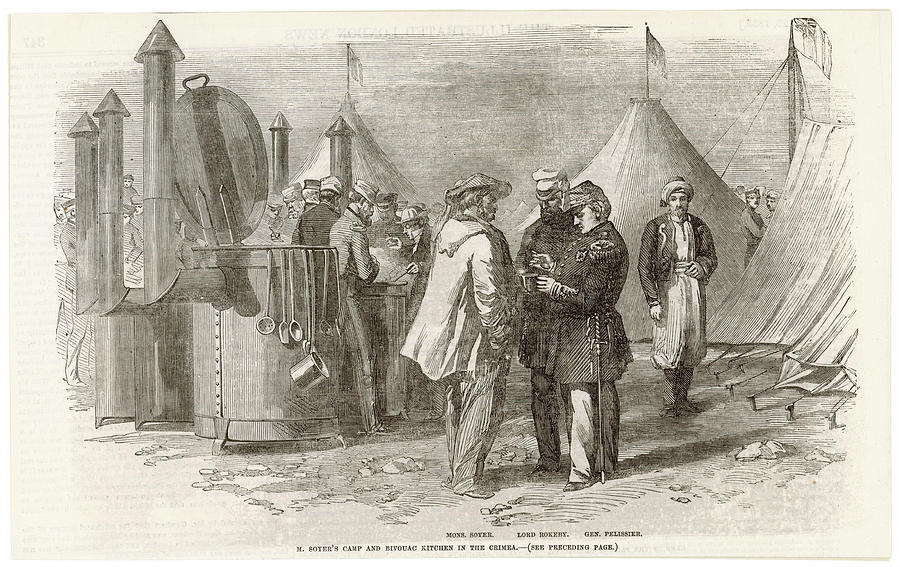
Ultimately, their work and affection between the two was terminated, but, only by death itself. Soyer’s reformation of army kitchens and methods in food preparation were outstanding and quickly won support among the officers’ wives. In those days, wives insisted on judging their warrior’s fare. Improvements continued and loss of life behind front lines rapidly diminished. Toiling so selflessly night and day under such appalling conditions, first Florence, then Alexis, succumbed to the very maladies they were fighting to eradicate.
The ravages of Crimea fever and dysentery very nearly claimed Miss Nightingale. For almost a year they continued across the Crimea improving army kitchens and thus saving lives. So exacting was the ordeal that Soyer never regained complete health. As the war ended he returned to England.
Soon thereafter, with the collaboration of Florence, he began to re-vamp the kitchens at Wellington Barracks. For the benefit of the military elite a sumptuous feast was prepared in the hard ration method developed at Scutari.
His accomplishments toward mass food preparations were, however, monumental and changed forever the methods of institutional cooking.
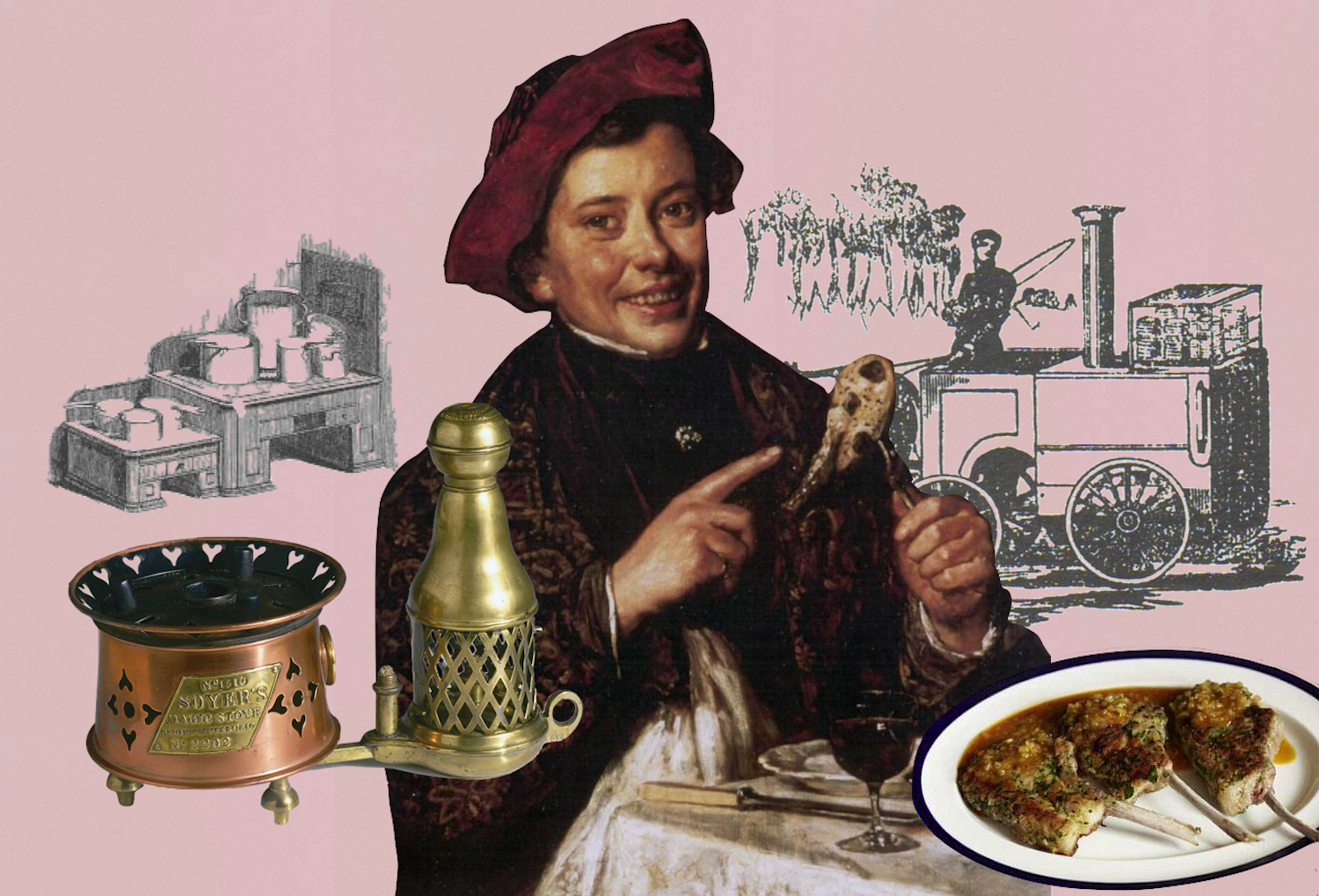
Soyer was roundly applauded and within a week he was dead.
He died in 1858 at the age of 48. “Soyer’s death is a great disaster,” Nightingale wrote. “Others have studied cookery for the purposes of gormandizing, some for show, but none but he for the purpose of cooking large quantities of food in the most nutritious and economical manner for great numbers of men. He has no successor.”
No, the hard rations were not the cause.
I said at the beginning of this treatise that Florence Nightingale and Alexis Soyer were mere mortals. And they were. It was circumstance that led them to their humanitarian endeavours and the paths in life that they inevitably travelled. Both could lazily have sat by and basked in wealth and or glory without risking their lives to pursue their work to better mankind. Both ended up changing the world for the better by sticking to the basics. Simple, honest food. Simple honest healthcare.
How revolutionary!
One of Soyer's recipes from the Reform Club was Lamb Chops Reform which are cutlets dipped in egg, bread crumbs, then fried.
Funny, that’s now a favourite in most restaurants and clubs in Australia today. Crumbed lamb cutlets!
Serve with lemon wedges and you will be pleasantly surprised.
Simplicity and Honesty. Life really isn't that hard now, is it?
If only our governments felt the same.
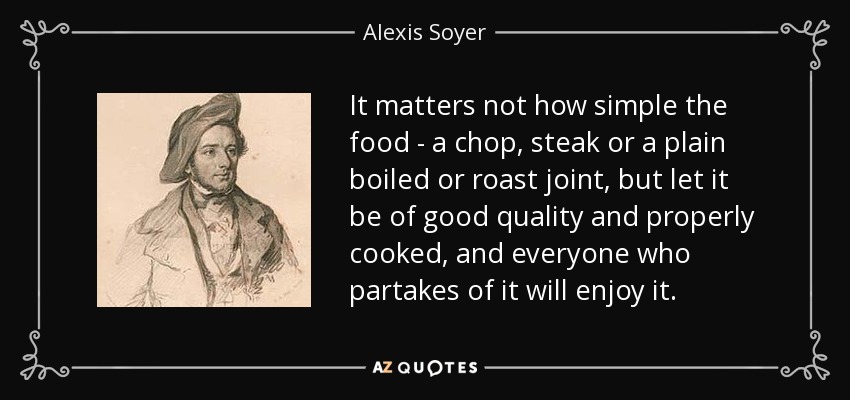
Chaucer
BLOG COMMENTS POWERED BY DISQUS



















































